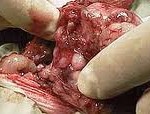Preventive surgery to remove healthy ovaries gives a triple benefit to high risk women according to a study. It lowers their threat of breast and ovarian cancer, and boosts their chances of living longer.
Women with the faulty genes have a dramatically higher cancer risks than other women. It has five times greater for breast cancer and at least ten times greater for ovarian cancer.
The study, appearing in the Journal of the American Medical Association, found benefits for women with two different BRCA gene variants.
However, the results offer more tailored evidence for women considering removal through ovarian surgery that would end fertility, fast forwards them into early menopause and may contribute to osteoporosis or heart problems later in life but also reduces threats of cancer for women.
Ten percent of the women chose mastectomy and 40 percent chose to have their ovaries removed while some had both.
More than half the women had neither surgery. The women who chose ovary removal had impressive results:
*** One percent were later diagnosed with ovarian cancer that showed up in cells missed by surgeons, compared to 6 percent of the women who kept their ovaries.
*** Eleven percent were diagnosed with breast cancer, compared to nineteen percent of the women who kept their ovaries.
*** Three percent of those who had surgery died, compared to ten percent of the others.
The study also found preventive mastectomy lowered the risk of breast cancer. No breast cancers were seen in the women who had their breasts removed. That may seem unsurprising, but mastectomy can leave behind breast tissue that can turn cancerous.
The study was observational, meaning it can’t prove one choice was better than another. Other factors could have caused differences in the woman’s cancer rates.
For women with a family history of breast or ovarian cancer, the decision to get tested can be agonizing. Surgery costs thousands of dollars, not including lost time at work. Without preventive surgery, a woman faces a regimen of mammograms, MRIs and blood tests to look for cancer.
With testing more than a decade old, researchers are just beginning to have better data to understand the benefits of cancer risk reducing surgery.
For high risk women, equally important are the breakthroughs in cosmetic breast reconstruction, laws to prevent genetic discrimination and evolving attitudes toward removing body parts to avoid cancer, said Joanna Rudnick, a 36 year old Los Angeles film maker.
